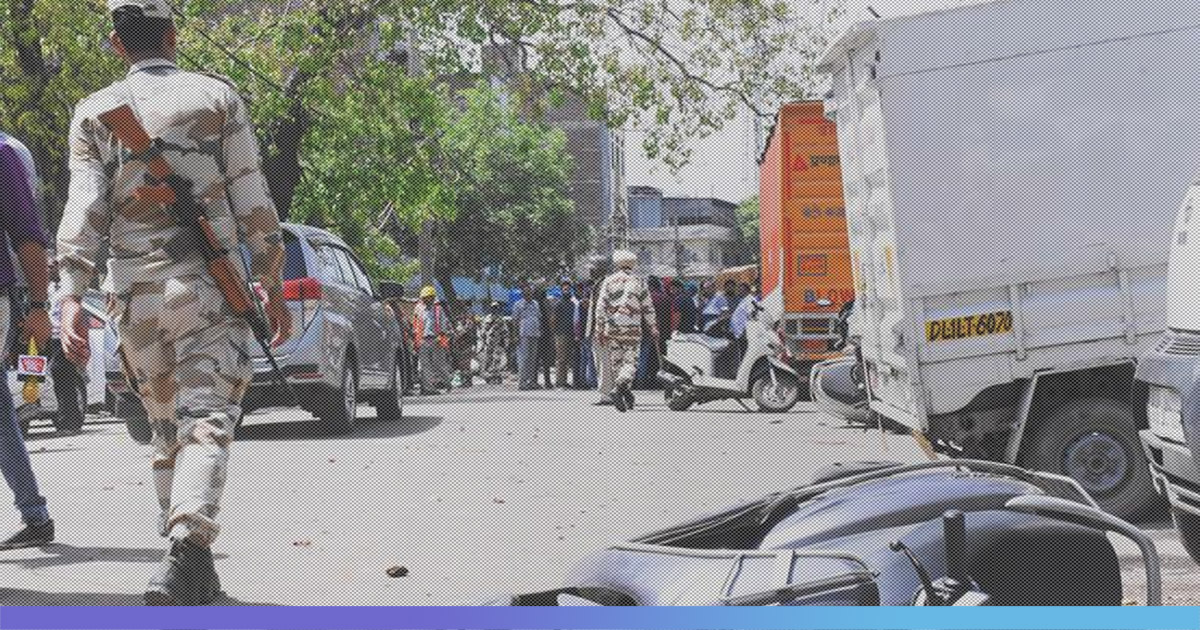You enter the market and you witness dismantled cars sitting on top of each other. Some are missing door which hang on walls behind then, some are missing engines, tires, and what not. Outside the shops, a few men are busy dismantling what once used to look like a car, and now is no more than a shell of metal. This is the scene from one of Asia’s largest automobile scrap market – Mayapuri.

The market is home to condemned vehicles and scrap metal pieces, not only from all around India but also from overseas including the US, the UK, Russia, Japan etc. There are different shops that deal with different kinds of metals, which come to them via a network of scrap dealers and haulers.
For a long time, the working conditions and the potentially hazardous nature of the material there has been a point of concern for the people living in and around the market, and supposedly for the authorities too. The material that arrives at Mayapuri is not scanned for hazardous chemicals and other material, and the people who work there do so without any proper safety equipment.

In 2010, the worst came to pass as there was a radiation leak which went undetected until 7 people were found infected a few days later. It was covered extensively by many publications, including the New York Times. According to its report, the case was called as the worst case of radiation exposure since 2006 by Didier Louvat, a nuclear waste specialist with the International Atomic Energy Agency. That was the time when the then government of India promised to take actions to address the issue.
Come 2015, and there was no significant change in any aspect. According to the report by Indian Express, the National Green Tribunal (NGT) passed an order in March 2015 that all, “…illegally and unauthorizedly operating scrap industries in Mayapuri generating chemicals, oils, and poisonous fumes resulting in air pollution, deaths, and diseases at large scale” be shut down.

3 years later and with still no visible action taken by the authorities, in October 2018, the NGT formed a special task force to take actions against the units operating illegally in Mayapuri. Quoting NGT chairperson Justice Adarsh Kumar, the Times of India reported that the task force, “…will comprise representatives of the Central Pollution Control Board (CPCB), Delhi Development Authority (DDA), Delhi Pollution Control Committee (DPCC), Delhi State Industrial and Infrastructural Development Corporation Limited, South Delhi Municipal Corporation (SDMC), the district magistrate, and the district police head.”
5 months later and with yet no action at the part of the task force, in March 2019, the NGT directed the Chief Secretary of Delhi, Vijay Kumar Dev, to provide a status report on the illegal scrap units in Mayapuri; as reported by The Hindu. The authorities were to provide a report by April 11, 2019.

In the report submitted by the DPCC on April 4, it said that there was not any, “…substantial improvement on the ground…Roads were observed to be black by spillage oils by illegal handling of engines.”
In the subsequent hearing on April 11, which was attended by representatives from all the concerned authorities and several business-owners from the Mayapuri industrial area and which has been extensively detailed in Outlook India, the NGT came down heavily on the Delhi Government and all the concerned authorities for non-compliance on its orders.
“We fail to understand why the guilty are not being prosecuted in spite of more than five years of order of this Tribunal…Why no officer has been dismissed nor any polluter arrested or punished.”
“Polluting activity causing deaths and diseases are no less than murder or attempt to murder…Why is the Chief Secretary feeling helpless in protecting the lives of victims, even though armed with all the powers under various laws.”
Rejecting the plea by the business-owners to allow the continuing of their businesses or for allocation of alternate land before the shutting down of their shops the Tribunal said,
“There is no merit in the applications seeking non-implementation of orders of the Tribunal, directing closure of illegal activities. If such activities have been going on since long, it does not create a right to continue the same.”
“There cannot be such blackmailing by the law violators. There cannot be any justification to cause pollution, and consequent death of people for earning by illegal means at the cost of life of others.”
Subsequently, the Tribunal directed the Chief Secretary and the DPCC to arrive with a compliance report by May 3, 2019.
As a result, the SDM Delhi Cantonment, along with staff from MCD and DPCC, carried out a sealing drive in Mayapuri Industrial Area phase II, on Saturday, April 13, 2019. Things took a turn for the worse when the drive turned violent with people from both the sides resorting to beating and hurling stones and bricks at each other.
This is not complete pictire, the actual mob size in below video creating ruckus against sealing in #mayapuri pic.twitter.com/DDw1cahzfP
— Ajnby (@ajnby) April 13, 2019
One @ITBP_official jawan carrying rifle was thrashed by unruly mob (though few saved him too) in #Mayapuri pic.twitter.com/qEtt6w6FeR
— Neeraj Rajput (@neeraj_rajput) April 13, 2019
#WATCH Clash broke out between locals & security forces in Delhi’s Mayapuri area after MCD officials began to seal some factories in the area following National Green Tribunal’s (NGT) order to seal nearly 850 factories. pic.twitter.com/sitlqU116Z
— ANI (@ANI) April 13, 2019
Reportedly, more than 30 people, including policemen and scrap-dealers were injured in the violence. Once the spiralling situation was brought under control, the DPCC and the district magistrate issued legal notices under sections 133 and 142 of the Code of Criminal Procedures (CrPC), instructing 765 illegally operating scrap-dealing establishments to vacate the premises, along with a warning to, “…not pose any hindrance or obstruction in complying with the directions, failing which actions will be taken against them… [and] there will be no responsibility of any kind on part of any government authority after the expiry of the deadline.”
The issue also, turned deeply political as representatives from BJP and AAP started laying the blame on each other. While Union Minister Hardeep Singh Puri, in his statement to ANI, called it a, “…failure [of the Delhi government] particularly of the Chief Minister Arvind Kejriwal.”
Union Min Hardeep Singh Puri on Delhi CM blaming centre for clash between locals&security forces in Delhi over NGT’s order on sealing 850 factories: NGT in 2015 gave instructions to Delhi govt to relocate scrap industries, as it causes pollution. Kejriwal govt had to implement it pic.twitter.com/4l4CZTHRaz
— ANI (@ANI) April 13, 2019
Arvind Kejriwal, on the other hand, blamed the BJP government for using force against the traders, calling PM Modi general Dyer, thus comparing the incident to the Jallianwala Bagh Massacre.
अपने ही व्यापारियों को इस तरह पीटना बेहद शर्मनाक है
व्यापारियों ने हमेशा धन और वोट से भाजपा का साथ दिया। बदले में भाजपा ने उनकी दुकानें सील की और उनको लाठियों से पीटा। चुनाव में भी व्यापारियों पर इतना बर्बर लाठी चार्ज? भाजपा साफ़ कह रही है- नहीं चाहिए भाजपा को व्यापारियों का साथ https://t.co/irVwvymdX8
— Arvind Kejriwal (@ArvindKejriwal) April 13, 2019
Delhi BJP president Manoj Tiwari also laid the blame on CM Arvind Kejriwal in a press conference, wherein he stated that, “Sealing was carried out by the SDM, who is under the Delhi Government…which makes it obvious that Kejriwal could have stopped it.”
As of now, reportedly, the Delhi High Court has issued a stay on any action against the traders in Mayapuri till May 26, which has been decided as the date for next hearing in the petition filed by the traders against DPCC.
For the latest updates, you can check out the tag #Mayapuri on Twitter.
Also Read: Sealing Drives In Delhi: SC Lashes Out At Centre For Breakdown Of Law & Order Due To Strikes










